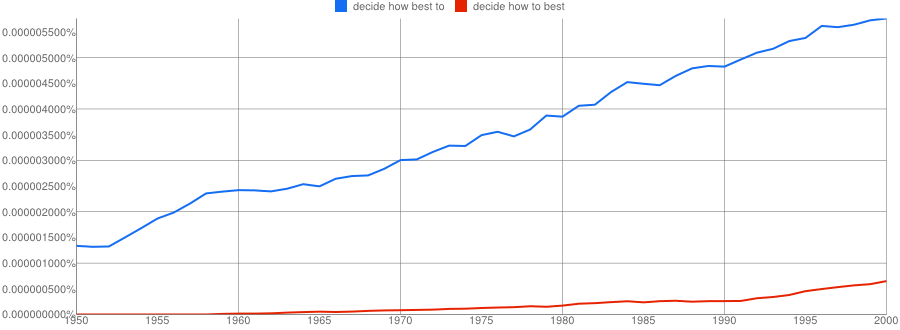Are there rules on the placement of 'best'?
- They are deciding how to best handle the matter.
- They are deciding how best to handle the matter.
Is one of them wrong?
Are there rules on the placement of 'best'?
- They are deciding how to best handle the matter.
- They are deciding how best to handle the matter.
Is one of them wrong?
Both are grammatical, but the second is probably found more frequently.
Like Barrie England said, both are grammatically correct and mean the same. But it is considered non-standard to split infinitives (to + verb forms) by many. So by that account, saying how to best handle (infinitive is split as best is placed between to and handle) might sound unusual, though grammatically correct.
Adding to @FumbleFingers 's Ngrams-based answer, some data from COCA (450 million word corpus, (dwarfed by the Ngrams corpus, but higher quality data)). Consistent with what NGrams shows, Coca shows the non-split version to be roughly four times as frequent. This supports @Barrie England 's answer.
The search term how best to [v*] gives 775 hits. Top ten hits:
1 HOW BEST TO USE 38
2 HOW BEST TO ACHIEVE 30
3 HOW BEST TO DO 29
4 HOW BEST TO DEAL 28
5 HOW BEST TO MANAGE 24
6 HOW BEST TO PROTECT 24
7 HOW BEST TO HELP 20
8 HOW BEST TO HANDLE 18
9 HOW BEST TO APPROACH 17
10 HOW BEST TO RESPOND 17
The search term how to best [v*] gives 184 hits (roughty 1/4 as many). handle is 13th on the list with 3 hits. Top ten are:
1 HOW TO BEST USE 15
2 HOW TO BEST UTILIZE 7
3 HOW TO BEST PREPARE 6
4 HOW TO BEST MEET 6
5 HOW TO BEST EDUCATE 5
6 HOW TO BEST PROTECT 5
7 HOW TO BEST REACH 4
8 HOW TO BEST APPROACH 4
9 HOW TO BEST FACILITATE 4
10 HOW TO BEST MANAGE 4
Interestingly, when the search terms are as above, the non-split-infinitive version is more frequent. When I use @FumbleFingers 's query, [decide] how best to [v*] / [decide] how to best [v*], the relative numbers are: 12 hits for the split infinitive, 56 hits for the non-split infinitive. The relative proportions remain more or less the same.
They're both valid, and I can't even be bothered to address the "split infinitive" (non-)issue, but this

is all you need to know if you want to sound like a native speaker.
The reason some people "decide how to best handle the matter" is probably nothing to do with "split infinitives" (which really are a complete non-issue, here and in other contexts). It's just that they're bothered by the fact that the "standard" usage clashes somewhat with similar constructions where the position of the adverb radically affects the meaning...
Decide how quickly to handle the matter.
Decide how to quickly handle the matter.
...are not the same! In the first version, how would normally be taken to modify quickly (i.e. - the decision is about how quickly the matter should be handled, not how to handle it quickly). But how certainly can't modify best in the same way (that would be deciding how well to handle things). And if you're thinking that "quickly" isn't the right word, note that...
"how quickest to" occurs 367 times in Google Books, whereas
"how to quickest" occurs only once.
SUPPLEMENTAL:
The answers by Barrie England and Inglish Teeture are entirely adequate. However, your two alternatives present a dilemma: would you rather annoy the readers who still hold to what Barrie calls the “myth of the split infinitive” or those readers who clamorously deny it?
Your job as a writer is to avoid annoying anybody, so your readers pay attention to what you’re saying rather than how you say it. Don’t give them anything to argue about. Sidestep the issue by rewriting:
They are deciding how to handle the matter best.
They are deciding what the best way of handling the matter will be.
Or, simplest of all (and probably more accurate, too, since there’s no guarantee that the ‘best’ solution will be adopted):
They are deciding how to handle the matter.